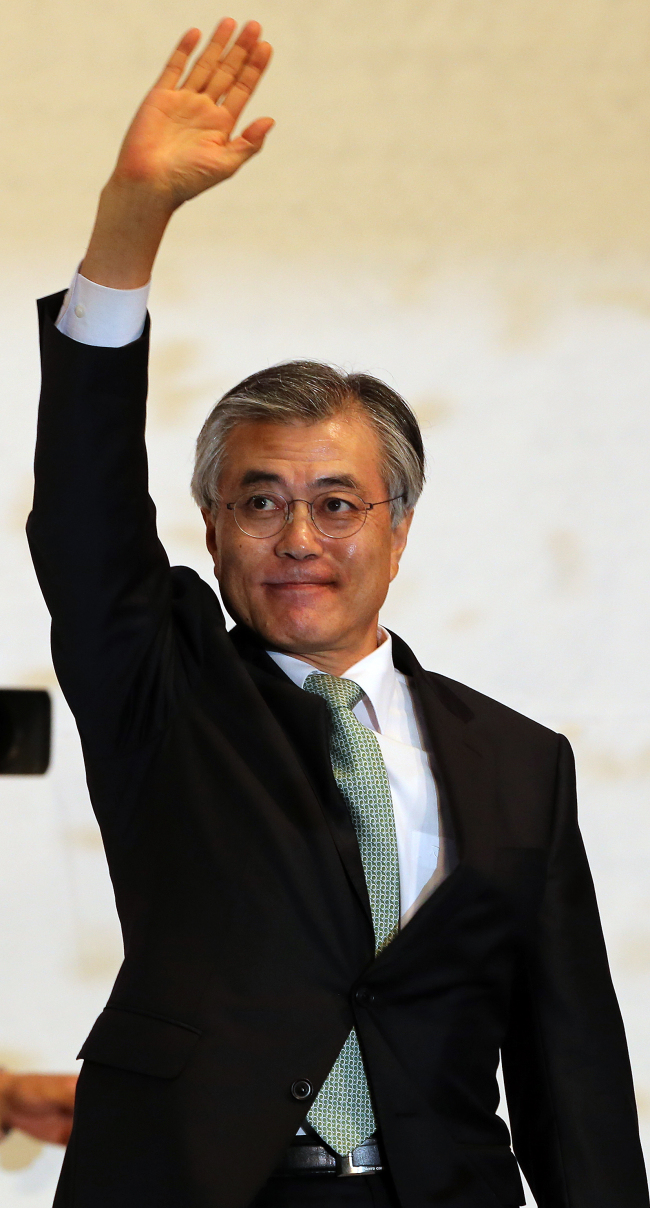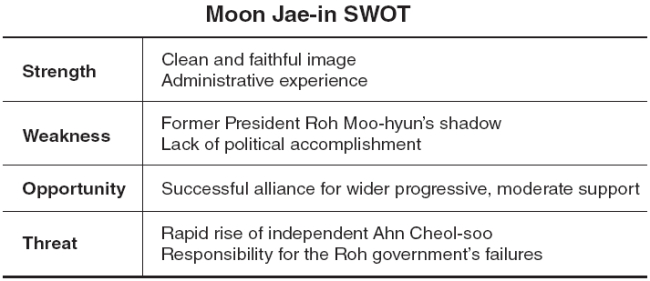Moon Jae-in focuses on welfare, economic democratization, political reform, improved ties with N.K.
From a recalcitrant student activist to a human rights lawyer and now the presidential candidate of the main opposition Democratic United Party, the life of Rep. Moon Jae-in has been tumultuous yet fortuitous.
Until early last year, few had thought the former chief of staff to late President Roh Moo-hyun would wade through the rough waters of politics to challenge the presidency.
“Politics is not in my blood,” he said then when asked to enter politics.
He had kept away from politics since Roh’s term ended in February 2008 despite persistent calls from political parties after Roh committed suicide in 2009 amid a corruption scandal surrounding his family and close associates.
Moon finally emerged as an opposition icon after he published his autobiography “Destiny” in June 2011 and played a key role in uniting fractured opposition forces with the DUP later in the year.
“Something like destiny has brought me here…where I am now,” he wrote in the book. The memoirs shed light on what he believes is his destiny ― undertaking the tough task of shoring up the liberal forces, regaining trust from the public tired of partisan politics and ultimately retaking power from the conservative ruling bloc.
From a recalcitrant student activist to a human rights lawyer and now the presidential candidate of the main opposition Democratic United Party, the life of Rep. Moon Jae-in has been tumultuous yet fortuitous.
Until early last year, few had thought the former chief of staff to late President Roh Moo-hyun would wade through the rough waters of politics to challenge the presidency.
“Politics is not in my blood,” he said then when asked to enter politics.
He had kept away from politics since Roh’s term ended in February 2008 despite persistent calls from political parties after Roh committed suicide in 2009 amid a corruption scandal surrounding his family and close associates.
Moon finally emerged as an opposition icon after he published his autobiography “Destiny” in June 2011 and played a key role in uniting fractured opposition forces with the DUP later in the year.
“Something like destiny has brought me here…where I am now,” he wrote in the book. The memoirs shed light on what he believes is his destiny ― undertaking the tough task of shoring up the liberal forces, regaining trust from the public tired of partisan politics and ultimately retaking power from the conservative ruling bloc.


Pledging to carry out his “people-first” principle, Moon has spearheaded a campaign for an integration of the liberal opposition forces since late last year and now stands firm as their standard-bearer.
Moon’s campaign focuses on five key pledges for job creation, broader welfare, economic democratization, political reform and improved ties with North Korea.
Poor, defiant student
Born in 1952 on the southeastern island of Geoje, Moon still remembers the poverty his family went through. After moving down to the island from Hamheung in North Korea during the Korean War, his father labored at a prison camp while his mother roved around the island selling eggs.
Around the time he entered elementary school, his family moved to the southern port city of Busan. To make a living, his family delivered briquettes from house to house, which a young Moon, sometimes, felt ashamed of as he recalled in his book.
During his middle and high school years, his defiant behavior earned Moon the nickname of “Moonjea” ― troublemaker in Korean.
Moon said that the stark economic gap palpable among classmates was frustrating. He was caught drinking alcohol and smoking cigars, for which he was suspended from school several times.
Despite his being a “troublemaker,” his grades were among the highestin his class. In 1972, he entered the law department of Kyung Hee University with a full scholarship in consideration of his parents’ wish, though he wanted to study history.
During his university years, society as a whole was in the throes of the struggle for democracy. Many students brought themselves to the fore to protest the dictatorial rule of then general-turned-president Park Chung-hee. Moon was not an exception.
In 1974-75, he planned and led rallies within his school to oppose the Yusin (or revitalizing reform) constitution aimed at prolonging Park’s rule. He was then put into jail for the protests.
After being slapped with a suspended eight-month jail term, he was released. Upon release, he was conscripted to be part of the Army’s special troops. He went through grueling military training including parachuting and waterborne infiltrations, and was rated an “A-class soldier,” he said.
After his discharge from the military in 1978, his father suddenly passed away, an event that pushed him to prepare for the bar exam so he could support his family. After studying for several months at a temple in Haenam, South Jeolla Province, he passed the first round of the exam in 1979 and took the second round the next year.
The fast-spreading pro-democracy rallies pushed him again onto the streets. In 1980, he joined around 200,000 students in massive protests in Seoul. He was then brought into police custody. The police cell was, however, an unforgettable site for Moon as he was notified of his passing the bar exam.
After finishing the required courses at the state judicial training institution, he wanted to be employed as a public judge. Although he graduated second from the institution, he failed to make it due to his protest records, and opted to become an attorney.
Moon married Kim Jeong-sook, an opera major who he met at a school festival. They tied the knot in 1980 after seeing each other for around seven years.
Fortuitous encounter with Roh
Moon, then, moved down to his childhood hometown of Busan in 1982. Through his friend Park Jung-kyu, who served as Roh’s senior secretary for civil affairs, he had what he terms a “fortuitous encounter” with Roh, who was seven years older than Moon.
“I didn’t even have the faintest idea that this encounter would lead to my destiny,” he said in the biography.
Opening a joint office, the two became lawyers specializing in human rights and labor issues. Roh was largely in charge of the overall office management while Moon usually defended their clients at court.
At the peak of popular protests against the rule of another general-turned-president Chun Doo-hwan, their office turned into a “regional center” for labor and rights issues, Moon recalled.
As they led the efforts to speak for the socially vulnerable, the two built a reputation as progressive, reform-minded lawyers. In the 1980s, Moon also represented a regional association of lawyers dedicated to promoting democracy.
In 1987, when the democracy movement reached its pinnacle before the 1988 Summer Olympics in Seoul, their relationship grew even closer, as they marched toward the same cause of democracy.
However, the two had to part as Roh won a parliamentary election and stepped into politics in 1988. Since then, Moon continued his job to defend laborers and democracy crusaders.
The two met again as Moon led a regional presidential campaign team for Roh in 2002. At crucial junctures when Roh had to make critical election-related decisions, he consulted Moon, his most trusted confidant.
At the center of power
Roh brought Moon into the presidential office, saying, “As you made me a president, you should take responsibility for that.”
Having been on the periphery as outside critics, the two were not used to being at the center of power. But their drive for democracy and social justice as human rights lawyers led to their push for a more horizontal, democratic leadership.
Moon first took the post of senior presidential secretary for civil affairs in 2003. At the time, he told Roh that this was the last presidential job he would take, and that Roh should not expect him to do politics, Moon noted in his book.
Amid deteriorating health and the then ruling Uri Party’s call to run in a parliamentary election, Moon offered to resign in February 2004. Hoping to get away from it all, he went climbing in the Himalayan mountains.
But his respite did not last long. As the motion to impeach Roh over his controversial remarks deemed to violate political neutrality passed through the National Assembly, Moon could not help but come back.
As Roh resumed his presidential duties, Moon took the job of senior secretary for civil society in 2004 and retook the post of senor civil affairs secretary the next year. But he offered to resign again in 2006 amid the ruling party’s call to run in a Busan mayoral election.
As Roh slipped deeper into his lame-duck status, Moon returned to Cheong Wa Dae and took the chief of staff post. He then successfully led two prodigious projects ― the signing of the Korea-U.S. free trade deal and the second inter-Korean summit, both of which took place in 2007.
Roh’s death and political debut
Calm yet deep in sorrow, Moon received the media spotlight again in May 2009 when he announced to the nation the death of the liberal leader. After his passing, Moon led the foundation to commemorate Roh.
Amid growing public disenchantment with established political parties, Moon published his autobiography in June, presaging his political debut.
The book explained his decades-old friendship with Roh and behind-the-scenes stories of the former liberal government.
More than 250,000 copies of the book were sold. He also joined a civil society group called “Innovation and Integration,” and spearheaded a campaign to shore up liberal unity.
In April, he won a parliamentary election in a Busan constituency, a traditional stronghold for the ruling Saenuri Party, and forged a comfortable foothold ahead of the December presidential race.
On the back of support from the political forces associated with the late Roh, Moon declared his bid for Cheong Wa Dae in June. “So far, I have been away from politics. But this gloomy era has called me in,” he said.
He triumphed in all 13 DUP primaries across the country with 56.5 percent of the vote and clinched the nomination on Sept. 16 for the presidential poll.
By Song Sang-ho (sshluck@heraldcorp.com)
-
Articles by Korea Herald








![[Kim Seong-kon] Democracy and the future of South Korea](http://res.heraldm.com/phpwas/restmb_idxmake.php?idx=644&simg=/content/image/2024/04/16/20240416050802_0.jpg&u=)








![[KH Explains] Hyundai's full hybrid edge to pay off amid slow transition to pure EVs](http://res.heraldm.com/phpwas/restmb_idxmake.php?idx=652&simg=/content/image/2024/04/18/20240418050645_0.jpg&u=20240418181020)

![[Today’s K-pop] Zico drops snippet of collaboration with Jennie](http://res.heraldm.com/phpwas/restmb_idxmake.php?idx=642&simg=/content/image/2024/04/18/20240418050702_0.jpg&u=)